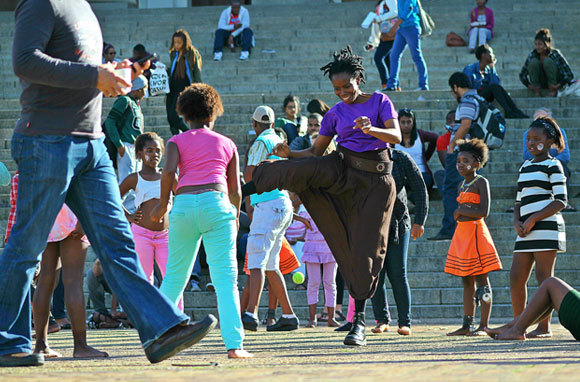The importance of play on display during Africa Month
28 May 2014 | Story by Newsroom
Play activist Dr Elelwani Ramugondo has long bemoaned the waning of play among South African children (and adults); a loss of interest in part due to the advent of electronic gadgets and growing concerns about safety, she says.
So naturally Ramugondo, head of UCT's Division of Occupational Therapy, took some delight in a recent showcase of traditional African games, hosted by the Transformation Services Office on 23 May as part of the Africa Month '“ and took part.
Ramugondo and about a dozen kids from Langa took over Jammie Plaza for an hour or so to demonstrate just how these games are still played and enjoyed. One or two brave UCT students also had a go, unable to resist the temptation to try their hand at games once so familiar.
The kids, aged six to 12, started with some singing games, known to them as uku qula. They also played impuku nekati, or cat and mouse, standing in circle while the 'cat' chased the 'mouse' in and around the perimeter. And to get the heart rate up among the UCT participants, there was some energetic gqabu, or rope-skipping.
It is such games that, fortunately, still have a place among children in some parts of the country, said Ramugondo: "Games are played in communities where spaces are still available. And these games become part of those communities."
 This work is licensed under a Creative Commons Attribution-NoDerivatives 4.0 International License.
This work is licensed under a Creative Commons Attribution-NoDerivatives 4.0 International License.
Please view the republishing articles page for more information.










